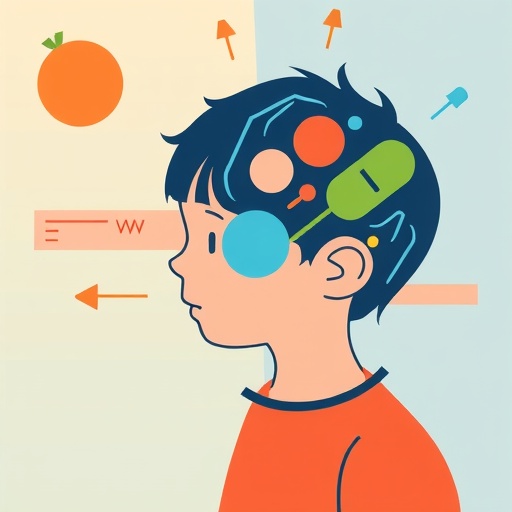In a groundbreaking study published in BMC Psychiatry in 2025, researchers have unveiled intricate connections linking sensory processing dysfunction with attention-deficit hyperactivity/impulsivity disorder (ADHD) and its commonly co-occurring behavioral symptoms. This extensive investigation, utilizing sophisticated network analysis techniques, sheds new light on the neurodevelopmental interplay between sensory processing, autistic traits, and oppositional defiant disorder (ODD) symptoms among children diagnosed with ADHD. The findings promise to revolutionize therapeutic approaches and deepen our understanding of the symptomatology underlying ADHD.
ADHD, a prevalent neurodevelopmental condition, is frequently accompanied by diverse behavioral manifestations, complicating diagnosis and treatment. Among these, sensory processing issues—whereby individuals exhibit atypical responses to sensory stimuli—have been increasingly observed but remain poorly understood in the framework of ADHD. The study’s primary objective was to delineate the nuanced relationships between sensory processing anomalies and the behavioral symptoms characteristic of ADHD as well as the overlapping presence of autistic traits (ATs) and ODD symptoms.
The research team recruited an impressive cohort of 2,676 children between the ages of 6 and 11 years, all clinically diagnosed with ADHD, from Peking University Sixth Hospital. Each child underwent comprehensive assessments covering ADHD symptom severity, oppositional defiant tendencies, sensory processing issues, as well as autistic-like behavioral traits. Notably, these dimensions were quantified through standardized scales including the ADHD Rating Scale, the Children’s Clinical Diagnostic Interview Scale, and the Child Behavior Checklist (CBCL), ensuring robust, multidimensional symptom profiling.
To decipher the complex relationships among these variables, the researchers employed advanced computational methodologies drawing from R statistical software packages such as mgm, qgraph, and bnlearn. These tools facilitated both undirected and directed network analyses, enabling the mapping of symptom interdependencies beyond traditional correlation frameworks. Such network models are pivotal in psychiatric research for unraveling causative and communicative pathways between co-occurring disorders.
One of the cornerstone findings emerged from the Graphical Gaussian Model (GGM), an undirected network analysis approach. The model revealed that sensory processing symptoms were not isolated phenomena but were intricately linked to autistic traits and core ADHD symptoms. Particularly, the sensory processing nodes occupied a position of influence, bridging behavioral traits across diagnostic categories. This confirms sensory dysfunction as a potentially foundational element within ADHD’s complex symptomatic constellation.
Further, the study employed directed acyclic graph (DAG) analysis to explore causal hierarchies among symptoms. This analysis positioned sensory processing items relatively upstream in the network hierarchy, implying that sensory challenges could influence or even precipitate other behavioral symptoms. Of note, a specific autistic trait node, labeled ATs_S, surfaced as a crucial mediator in this network. ATs_S appeared to facilitate communication between sensory processing elements and oppositional defiant symptoms, ultimately impacting ADHD features downstream.
This hierarchical structuring implies that interventions targeting sensory processing issues might not only alleviate those specific symptoms but could also cascade to reduce autistic trait expression and oppositional behaviors. Such insights are transformative, suggesting that sensory processing is not merely a comorbid feature but potentially a driving factor within ADHD and its behavioral comorbidities, challenging traditional treatment paradigms focusing solely on core ADHD symptoms.
Clinicians and researchers alike may find value in these perspectives, as they highlight the importance of precise, symptom-network-informed diagnostics. Treatments incorporating sensory integration therapies alongside behavioral and pharmacological approaches might yield better outcomes for children navigating the multifaceted challenges of ADHD with coexisting autistic and oppositional traits. Moreover, understanding symptom interrelations fosters personalized medicine, allowing intervention strategies to be tailored based on an individual’s unique symptom network profile.
The utilization of network analysis methodologies in psychiatric research exemplifies the shift toward more dynamic models of mental health disorders, emphasizing interconnectivity over isolated symptom clusters. This study adds to a growing body of evidence that mental disorders should be conceptualized as complex systems where different symptom domains interact bidirectionally, influencing onset, perpetuation, and response to treatment.
This research was conducted with meticulous rigor, capitalizing on a large, well-characterized clinical sample and leveraging cutting-edge statistical technologies. By elucidating sensory processing’s centrality in ADHD symptom networks, the study charts new avenues for exploring neurobiological underpinnings and offers empirical justification for integrating sensory-driven assessments in clinical settings.
While the study robustly demonstrates associative and directional relationships, further research is warranted to explore underlying mechanisms such as neural circuitry, genetic influences, and environmental factors that modulate the observed symptom interactions. Longitudinal designs could also clarify how these dynamic networks evolve through developmental stages and in response to intervention.
In sum, this investigation pioneers a refined comprehension of ADHD as a multi-dimensional condition profoundly influenced by sensory processing capacities and intertwined with autistic and oppositional symptoms. Such knowledge not only enriches the theoretical landscape but provides a tangible framework for enhancing clinical care. As ADHD prevalence continues globally, incorporating network science into psychiatric evaluation offers promising potential to improve prognostic accuracy and therapeutic effectiveness.
The convergence of sensory processing dysfunction with ADHD symptomatology and associated behavioral challenges illustrates the necessity of holistic assessment paradigms in child psychiatry. This integrated perspective encourages a shift from siloed diagnostic categories toward embracing a symptom network viewpoint, thereby fostering greater empathy, precision, and success in managing complex developmental disorders.
Subject of Research: The study investigates the interconnected roles of sensory processing dysfunction, ADHD core symptoms, autistic traits, and oppositional defiant disorder symptoms in children diagnosed with ADHD, using network-based analytic methodology.
Article Title: The relationship of sensory processing with ADHD and its co-occurring behavioural symptoms based on both undirected and directed network analysis
Article References:
Li, J., Gao, Y., Dong, M. et al. The relationship of sensory processing with ADHD and its co-occurring behavioural symptoms based on both undirected and directed network analysis. BMC Psychiatry (2025). https://doi.org/10.1186/s12888-025-07636-z
Image Credits: AI Generated
DOI: https://doi.org/10.1186/s12888-025-07636-z




